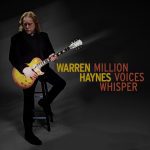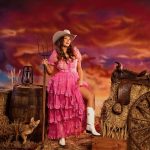Interview: Blues legend Johnny Winter
by Nick DeRiso
Johnny Winter returns to some of his earliest childhood favorites, and a few tracks from his first bar bands, on the aptly titled new project Roots. The Megaforce Records release boasts an all-star cast of guest artists including Derek Trucks, Vince Gill, Susan Tedeschi and his brother Edgar Winter, performing tracks originally done by everyone from Elmore James to Bobby “Blue” Bland.
“They’re songs I grew up really liking, things I was really influenced by,” Winter told us. “It’s very exciting, a record that really takes me back. All of those songs, I really identify with.”
It shows.
The opening “T-Bone Shuffle,” featuring Sonny Landreth, finds Winter in fine voice — singing in sweet counterpoint to Landreth’s tangy slide retorts on the old 1940s-era T-Bone Walker vehicle. Warren Haynes, of the Allman Brothers and Gov’t Mule, sits in for a stamping update of James’ “Done Somebody Wrong”; “everything that happened, you know I am to blame!” Winter shouts, and he doesn’t sound too sorry at all.
“Last Night” finds John Popper, of Blues Traveler fame, curling up at Winter’s feet, chortling and chugging on the harmonica. John Medeski then gets greasy and good on the old John Lee Hooker/Ray Charles hit “Come Back Baby,” pulling this rib-sticking, gospel-drenched sound out of the organ.
Winter also goes it alone on a pair of familiar blues standards, Robert Johnson’s “Dust My Broom” and the Muddy Waters hit “Got My Mojo Workin,'” which skips along at a breakneck pace.
Winter, of course, has a long history with Muddy. Working as the blues legend’s producer, Winter sparked a late-career resurgence for Waters — beginning with 1977’s Hard Again, which included a raw new take on “I Can’t Be Satisfied.” “That’s my favorite part of my career,” Winter enthuses. “It was live in the studio. He picked the songs — although he did do that one (“I Can’t Be Satisfied”) for me. I wanted to do at least one acoustic song. It only took about two or three days to do the whole record. He really liked working with me. We never had one argument.”
Their relationship continued with the Grammy-winning projects I’m Ready in 1978 and Muddy Mississippi Waters Live in 1979, through to Waters’ final release, 1980’s King Bee. But it never defined Winter, who — despite his protests to the contrary — has always been too much of a rock ‘n’ roll rebel to play it straight for long.
Take Roots, as Winter stops to give a tip of the hat to Chuck Berry, whose underrated work at Chess Records influenced a raft of other future blues stars like Bob Margolin and Duke Robillard. Winter doesn’t pick one of more obvious blues-influenced sides — like, say, “Wee Wee Hours.” Instead, we’re treated to a spirited rendition of “Maybelline.” “That song has stuck with me,” Winter says. “It’s what I grew up listening to.”
In many ways, though, Roots is as far away as it can be from his biggest seller, 1970’s Johnny Winter And — the first of several notable collaborations with Rick Derringer that loudly blended blues and heavy rock. There’s a reason for that: “That’s the least favorite point in my career,” Winter says, matter of factly. “I really wanted to do blues. It was probably the right thing to do at the time, though. I just didn’t enjoy it that much. That’s still my biggest selling record — even though I like it the least, it’s my most successful.”
Album highlights on Roots, issued earlier this month, include a duet vocal performance with Tedeschi on “Bright Lights, Big City,” as the two build an instant bedraggled kinship during this loping Jimmy Reed classic; and then a pairing with sibling Edgar, who adds a sharp-edged glory — but on sax! — to “Honky Tonk.”
Here are Wintery takes on …
WOODSTOCK, where the daring up-and-coming star reportedly played without a set list: “We just did our stuff. Sometimes, we had a set list; sometimes, we didn’t. It was nice, being there in front of that many people.”
HIS BREAKTHROUGH, performing a cover of B.B. King’s “It’s My Fault” in 1969 at the Fillmore East: “It was very exciting. That was the first time I played for that kind of crowd in my life. I used to do that song all the time. It turned out to be a very important song, since it got me my first record deal.”
THE NEW ORLEANS CONNECTION, something that’s propelled releases like 1984’s ‘Guitar Slinger’ (which included a hopped-up version of “Trick Bag”) and 1986’s ‘3rd Degree’ (featuring Mac ‘Dr. John’ Rebbenack). He’s also recorded songs by and worked with Allen Toussaint and Snooks Eaglin: “I always heard a lot of New Orleans music, growing up in Beaumont, Texas. I loved working with Mac. He’s such a great piano player.”
SLY STONE, a fellow Woodstock alum with whom Winter reunited for this year’s ‘I’m Back!: Family and Friends’ — though the two never actually worked on their duet at the same time: “He was always at his place. He spent the tapes, and I put my part on it. I’ve done a lot of shows with Sly back in the late 1960s and early 1970s. He put out some great records, but then he got caught up in drugs and he hadn’t been working. It’s good to see he’s back.”
DALLAS, TEXAS, the subject of one of Winter’s most memorable bloody-knuckled country-blues fables. He calls it one of the meanest places he knows: “I get in a fight every time I go to Dallas. (Chuckles.) That was more of what I wanted to be doing, just the blues.”
Continue reading at www.SomethingElseReviews.com …




